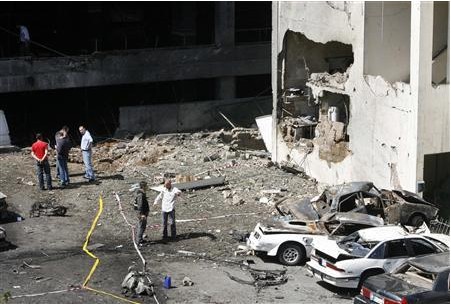 The Lebanese Prime Minister, Fuad Siniora, has sent a formal request to UN Secretary General Ban Ki-moon calling for the ratification of an international court for Lebanon. The tribunal will be used to try suspects involved in the assassination of former Lebanese Prime Minister Rafik Hariri, who was killed in a massive explosion there in February, 2005. The tribunal will be of "an international character" and will investigate political assassinations that have occurred in Lebanon since October, 2004. Mr. Ban stated; "as a matter of principle, there should be no impunity for the perpetrators of political assassinations."
The Lebanese Prime Minister, Fuad Siniora, has sent a formal request to UN Secretary General Ban Ki-moon calling for the ratification of an international court for Lebanon. The tribunal will be used to try suspects involved in the assassination of former Lebanese Prime Minister Rafik Hariri, who was killed in a massive explosion there in February, 2005. The tribunal will be of "an international character" and will investigate political assassinations that have occurred in Lebanon since October, 2004. Mr. Ban stated; "as a matter of principle, there should be no impunity for the perpetrators of political assassinations."
A draft resolution regarding the tribunal was circulated last week by the United States, France and Britain. The draft is a Chapter VII resolution, which is supported by the authorization for use of force, making it a mandatory resolution for Lebanon. Lebanese officials fear that civil war will erupt if there is no tribunal, while pro-Syrian groups fear increased violence if there is one.
In 2005, the International Independent Investigation Commission (IIIC), a preliminary Security Council investigatory body, had found that Lebanon was not capable of adequately examining political assassinations there. The IIIC mandate expires in 2008.
Clashes between the Lebanese army and members of the militant group Fatah al-Islam have been escalating near Tripoli. On Sunday, 50 people were killed in what cabinet minister, Ahmad Fatfat, has stated is an effort to sabotage the UN tribunal to try suspects of the assassination of Hariri. Fatfat said in an interview last week that "There is someone trying to create security chaos to say to world public opinion: "Look, if the tribunal is established, there will be security trouble in Lebanon."
Fatah al-Islam is a Sunni militant group based in a Palestinian refugee camp in Nahr al-Barred. The fighting began when militants attacked army posts around the refugee camp in northern Tripoli. It formed last year as a break away faction of the Syrian-backed Fatah Uprising group. In a statement faxed to the Reuters news agency, the group has said it will "open the gates of fire" if the Lebanese army continues "the provocative acts."
The recent conflict is the worst internal conflict since the civil war in Lebanon from 1975-90. In related news, Israel forces continue to attack Palestinian areas to prevent spill-over from the HAMAS-Fatah civil conflict there, further destabilizing the region.
Picture credit: Reuters